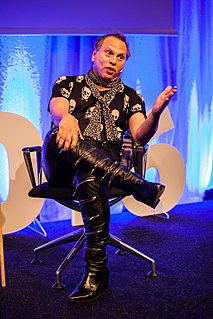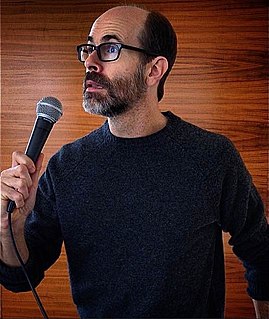A Quote by Jules Feiffer
At the time, liberals didn't understand that they had First Amendment rights. So, I was doing cartoons in this narrative cartoon form about subject surrounding that and as I was turned down by editor after editor at each publishing house, I began to notice on their desks this new newspaper called The Village Voice, which I then went and picked up and thought, well my god, these editors that were turning me down all, whom tell me how much they like my stuff, but they don't know how to market it because nobody knows who I am. If I got into this paper, they would know who I am.
Quote Topics
About
After
Am
Amendment
Because
Began
Cartoon
Cartoons
Desks
Doing
Down
Each
Editor
Editors
First
First Amendment
First Amendment Rights
Form
God
Got
Had
House
How
How Much
Know
Know How
Knows
Liberals
Like
Market
Me
Much
Narrative
New
Newspaper
Nobody
Nobody Knows
Notice
Paper
Picked
Publishing
Publishing House
Rights
Stuff
Subject
Surrounding
Tell
Then
Thought
Time
Turned
Turned Down
Turning
Understand
Up
Village
Voice
Well
Were
Which
Who I Am
Whom
Would
Related Quotes
I feel like I have more experience with publishing humor than pretty much any editor I'm going to be dealing with so sometimes I'll get a little bit nuts if I write something I know is good a certain way, and some editor because of some restriction he has and wants to change it that I know is going to make it less funny that'll piss me off and then I'm inclined to go, "Well, hey I've been doing this a long time, maybe you should..." That doesn't happen that often, but I'm more likely to say that now than I would have been a long time ago. Because dammit, I'm infallible!
I'd written my first novel for adults, which was called Basic Eight and was set in a high school, and we were having a devil of a time selling it. It ended up in the hands of an editor of a children's publishing house, for which it was entirely inappropriate. She said, "Well, we can't publish this, but I think you should write something for children," which I thought was a really terrible idea.
What's in yesterday's newspaper is today's fish-and-chip paper. If it really affects my life so badly, so personally, then I would do something about it. When it's really out of order, or something possibly detrimental to my family, or I'm driven to such a level that I know that this can be picked up and repeated again, I will just write or e-mail the newspaper editor. So, in the next day's newspaper, it might say, "Tracey Emin says this is factually incorrect."
Now, almost twenty years since my last job in book publishing, I know that there are far more socially inept people in book than in magazine publishing. At the time, however, I just didn't feel I was enough: smart enough, savvy enough, well read enough, educated enough, charming enough. Much of this was probably because I was very naive, and didn't really know how to behave in an office. This made me a terrible assistant, which in turn made me a terrible junior book editor.
I don't know exactly what a prayer is. I do know how to pay attention, how to fall down into the grass, how to kneel down in the grass, how to be idle and blessed, how to stroll through the fields, which is what I have been doing all day. Tell me, what else should I have done? Doesn't everything die at last, and too soon? Tell me, what is it you plan to do with your one wild and precious life?
Nobody knows I'm different. Or they may know, but they don't know how different and they don't know what this thing is that's driving me because I can't... this is... these are charges ... which I understand having got two children of my own and having had these mad thoughts myself that you know, I've got to get out there and do something. I don't know what it is, but it's got to be interesting.
Whether these were liberal publications or conservative publications, whether they were mainstream or slightly to the side of the mainstream; out of the mainstream, they all believed that they had the right to tell you how to stylize yourself. And from the New York Times to the much more left-winged nation. And The Voice said, no, whatever you want to. You drew whatever you want to, we'll publish it. Nobody was doing that. Nobody does it today. The Voice is no longer that paper, and editorializing is now in the hands of editors, with few exceptions.
Because You have called me here not to wear a label by which I can recognize myself and place myself in some kind of a category. You do not want me to be thinking about what I am, but about what You are. Or rather, You do not even want me to be thinking about anything much: for You would raise me above the level of thought. And if I am always trying to figure out what I am and where I am and why I am, how will that work be done?
God has always been in my life and his little voice in me that lets me know when I'm falling a little too far left or right, up or down you know. I know because there is a little voice that starts saying, 'damn it, what are you doing? You need to slow down with that' or I might not be a good person to hang around you know... So God will do this to me in some sort of way. Or something bad will happen to me.
I think there are actors who are like, 'Okay, what am I doing, how am I doing it, what's the appeal? Tell me what to do, what are the exact lines from the script? Okay, I got it.' I am not that way. I would be a terrible bus driver. I'd want to be like, 'Oh, let's take this side road! Let's see what happens when we go down this back alley.'
The first time I punched in my name and saw how many sites there were, I thought, that's scary. I got too involved where I got worried and panicked and tried to stop it. But you know what, if I just let it go and not worry about it, then it will be fine. Because it's all about how it makes me feel and I was letting it get to me.
With My Dog-Eyes by Hilda Hilst got more exposure and reached far more readers than I ever expected. Even my editor at Melville House, who championed the project form the outset, told me she was surprised by the response. After this, editors began asking my opinion about which Latin American writers ought to be translated. I realized I had some cultural capital to spend, and I wanted to use it to introduce another author who might be considered a risk by conventional publishers. Michael Noll was at the top of my list.


































